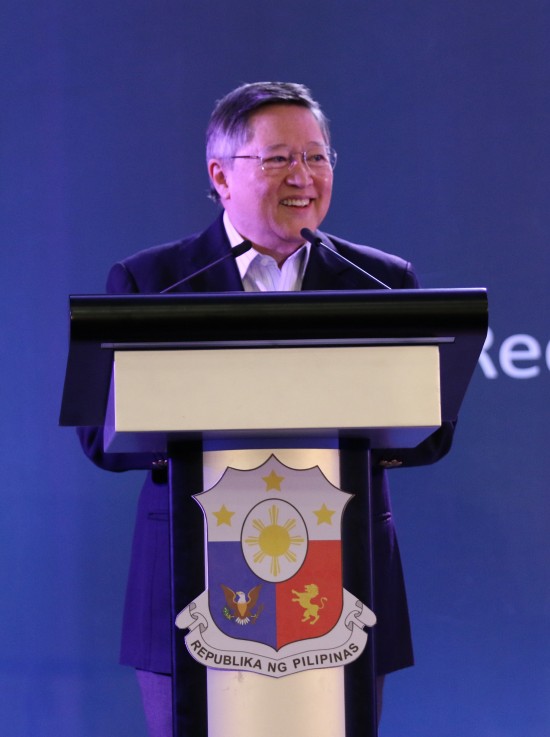DAVAO CITY–The Duterte administration is convening the first of its series of “inclusive deliberations” with development stakeholders in a bid to reach consensus behind the policies and concerted actions that would flesh out the paramount objective of its 10-point socioeconomic agenda to keep growth at 7 percent, create enough jobs, and liberate 1.5 million Filipinos from poverty annually over the next six years.
Finance Secretary Carlos Dominguez III said the first Philippine Development Forum (PDF) under the present administration will be the start of a string of “detailed, practicable and meaningful” annual fora—and possibly even smaller, intermittent—meetings on the Duterte watch, which are all geared to find ways on how to transform high growth into a truly inclusive one for all Filipinos.
“At the close of this meeting, we hope to see consensus points that will be a guide to policymaking and the starting point of concerted action on behalf of our people,” said Dominguez in his welcome remarks at the opening day of the PDF held at the SMX Convention Center here in Lanang.
“Let me assure all of you that free speech is guaranteed in this Forum. As a house rule, we will discourage privilege speeches and long rants. This will help ensure that speaking time will be more equitably distributed. We might refer to this as “inclusive deliberation” akin to the “inclusive growth” we seek to achieve for ourselves,” added Dominguez.
Dominguez, the chairperson of the PDF, said that through the two-day forum, the government aims to craft with stakeholders the initiatives that will support the government’s plan to accelerate spending on infrastructure, human capital development and social protection for the poorest of the poor, as well as programs conducive to attracting fresh investments in businesses, which, in turn, will spell more jobs for Filipinos over the medium term.
“The overarching goal of this administration’s reform program is the reduction of poverty by about 8 percent over the medium term. Each year, we aspire to liberate 1.5 million Filipinos from misery. The reduction of poverty will be made possible by maintaining an annual GDP growth rate of at least 7%. The high growth rate will not be enough if it is not inclusive. We have seen in the past few years that our economy, while posting healthy growth, made the rich richer and the poor poorer,” Dominguez said.
The Duterte administration’s maiden PDF, Dominguez said, will tackle the major themes, and “intends to put more meat in the bones of” the President’s 10-point socioeconomic agenda.
Hence, the forum will be highlighted by breakout sessions organized under the following subjects: 1) macroeconomic and fiscal policies, which include the proposed tax reform program of the Department of Finance (DOF) ; 2) peace and development initiatives in Mindanao; 3) infrastructure and competitiveness, which include the development of science and technology, building an efficient transport network and improving the ease of doing business; 4) rural development, which include land administration and management and food security; and the 5) development of human capital, which include social protection programs for the poorest of the poor and the implementation of the reproductive health law.
“Given the wide and enthusiastic participation in this Forum, we expect the consensus points and the best insights to be folded into the Philippine Development Plan for 2017-2022. This is not idle deliberation. What this Forum represents is public engagement in the formulation of national plans,” Dominguez said.
Dominguez said the Duterte presidency will strive to avoid a failure in governance by laying the ground over the next half-decade for the Philippines to achieve high-income status in a generation or by 2040.
Dominguez said that unless the Duterte administration takes the lead with the other stakeholders in mounting concerted actions to attain inclusive growth and create enough jobs for the people, the Philippines might miss its only opportunity to become a high-income economy in a generation.
“By 2040, our demographic sweet spot will have passed. We will become an aging population unable to maintain high inclusive growth rates. With the dramatic change in our demographics, the probability is high that the Philippines will never become a rich economy with a negligible poverty rate. This will be a calamity inflicted by failure to govern well,” he said.
It was also here in Davao City that the then-incoming economic team of President Duterte convened the two-day Sulong Pilipinas workshop with the various sectors last June to draw up its 10-point socioeconomic agenda.
International institutions as well as local business groups have lauded the administration for convening Sulong Pilipinas ahead of Mr. Duterte’s assumption to office and for pushing this masterplan to sustain high growth and drastically reduce poverty, attract foreign direct investments and create enough jobs, restore peace and order, and foster better relations with the country’s neighbors.
The institutions and organizations that have lauded the 10-point socioeconomic agenda are the World Bank, the International Monetary Fund (IMF), Asian Development Bank, Japan International Cooperation Agency, the American Chamber of Commerce and Industry, the European Union, the EU-Asean Business Council, and the foreign embassies of China and Spain, to name a few.
Some 400 stakeholders from the national government and local government units (LGUs), business sector, the development partner community, the academe and civil society are participating in the two-day PDF.
The last PDF formal meeting was held in February 2013, also in Davao City.
The past government has managed to improve the lives of the marginal poor by way of projects like the Pantawid ng Pamilyang Pilipino Program (4Ps), a conditional cash transfer (CCT) initiative in which poor families are given cash in exchange for meeting certain conditions like sending their kids to school and getting medical check-ups at barangay health centers, Dominguez said.
But he stressed that the task of the new administration is now more challenging, albeit doable, as it is easier to uplift the lives of those near the poverty line than those who are extremely poor, which is the goal of President Duterte.





